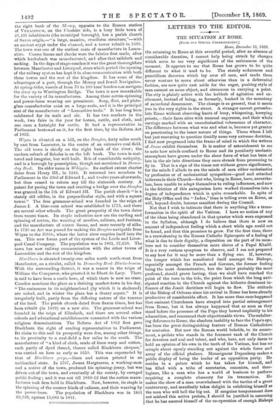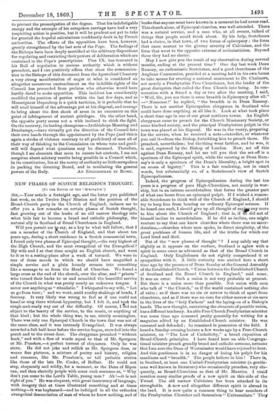LETTERS TO THE EDITOR.
THE SITUATION AT ROME.
traou OUR SPECIAL CORRESPONDENT.] Rome, December 11, 1869. ON returning to Rome at this eventful period, after an absence of considerable duration, I cannot help being struck by changes which seem to me very significant of the seriousness of the moment. It appears to me that Rome has grown to be quite different to what it used to be. The stately sedateness and punctilious decorum which lay over all men, and made them never venture to move about otherwise than in a deferential fashion, are now quite cast aside for the eager, pushing style of men earnest on some object, and strenuous in carrying a point.
The city is plainly active with the hubbub of agitation and ex- citement, instead of being, as formerly, hushed in the monotony of sacerdotal demeanour. The change is so general, that it meets you in the very sights in the street. A stranger cannot perambu- late Rome without observing knots of busy, whispering, hurrying priests,—their faces alive with unusual eagerness, and their whole carriage marked with an unecclesiastical vehemence of character. The difference between what was and what is, becomes yet greater on penetrating to the inner nature of things. Those whom I left but just venturing to question timidly some very extreme doctrine, I find now progressed into the frame of mind in which the writers of Janus exhibit themselves. It is matter of astonishment to me to note how minds confined to Rome and its peculiarly unelastic atmosphere have grown under the sheer force of what has been of late in the air into directions they once shrank from presuming to fly in. That is a sign of the times not without grave significance, for the minds I allude to are the minds of men either ecclesiastics by profession or of ecclesiastical sympathies—good and attached believers in their Church—but who, living in Rome, have, neverthe- less, been unable to adapt themselves to ruling influences, and now in the friction of this antagonism have worked themselves into a degree of independence which is quite remarkable. In spite of the Holy Office and the " Index," time is telling even on Rome, as will, beyond doubt, become manifest during the Council.
Not that I wish to intimate that there is anything like a trans-
formation in the spirit of the Vatican. I have no notion of any of the ideas being abandoned in that quarter which were expressed in the Syllabus, although I do believe that there is now an amount of independent feeling which a short while ago could not be found, and that this promises to grow. For the first time, there is a reawakening in the Roman Catholic Episcopate of a feeling of what is due to their dignity, a disposition on the part of its mem- bers not to consider themselves mere slaves of a Papal Khalif. It is a very curious symptom to observe, and I am not prepared to say how far it may be more than a flying one. If, however, the temper which has manifested itself amongst the Bishops, especially amongst the French and German, the former feeling being the most demonstrative, but the latter probably the most profound, should prove lasting, then we shall have reached the point of the turn in the tide, the point from which the long anti- cipated reaction in the Church against the hitherto dominant in- fluence of the Jesuit doctrines will begin to flow. The attitude of the Bishop of Orleans since his arrival in Rome has been already productive of considerable effect. It has more than once happened that eminent Churchmen have strayed into partial estrangement from Rome, but it has always happened that as soon as they stood before the presence of the Pope they bowed implicitly to his admonition, and renounced their objectionable views. The unfalter- ing deference to Rome, the absolute inability to face the Pope's eye, has been the great distinguishing feature of Roman Catholicism for centuries. But now the Roman world beholds, to its amaze- ment, a prelate who stands in the foremost rank of the Church for devotion and zeal and talent, and who, here, not only dares to hold an opinion of his own in the teeth of the Vatican, but has no scruple about openly standing out against the whole force and array of the official phalanx. Monseigneur Dupanloup makes a public display of being the leader of an opposition party. He resides in a palace which he has taken for himself, and has filled with a tribe of secretaries, canonists, and theo- logians, like a man who has a world of business to perform requiring a complete chancery for its transaction. He makes the show of a man overwhelmed with the tactics of a great controversy, and manifestly takes delight in exhibiting himself as the man who will bell the big cat. If sanguine temperament does not mislead this active prelate, I should be justified in assuming that he has assured himself of the co-operation of enough Bishops to prevent the promulgation of the dogma. That his indefatigable energy and the example of his outspoken carriage have had a very inspiriting action is positive, but it will be prudent not yet to take for granted the hopeful calculations confidently dealt in by French -authorities. The efforts of the opposition have been, however, greatly strengthened by the last acts of the Pope. The feelings of the Bishops have been deeply mortified at the arbitrary dispositions for regulating and restricting their powers of deliberation which are contained in the Pope's prescriptions. Pius IX. has ventured in his Bull of regulation to assume authority which is without precedent, and I can positively affirm that since the communica- tion to the Bishops of this document from the Apostolical Chancery -a very strong manifestation of anger at what is considered an altogether monstrous encroachment on the indelible rights of the Council has proceeded from prelates who otherwise would have hardly dared to make opposition. This incident has considerably snodified the position of parties within the last few days, and as Monseigneur Dupanloup is a quick tactician, it is probable that he will avail himself of the advantage put at his disposal, and manage to bring about the first shock of arms in an encounter on this point of infringement of ancient privileges. On the other hand, the opposite party seems not a whit inclined to shirk the fight. On the contrary, its leading champions—Archbishops Manning and Deschamps,—have virtually got the direction of the Council into their own hands through the appointment by the Pope (and this is -again a stroke of violence contrary to all preCedent) of men all of their way of thinking to the Commission on whose vote and good- will will depend what questions may be discussed. Therefore, though I see elements that seem to ensure hot contests, I am not sanguine about salutary results being possible in a Council which, in its constitution, lies at the mercy of authority so little scrupulous yin packing the directing Board, and in mutilating the general







































 Previous page
Previous page